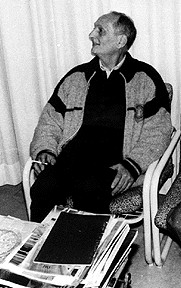Libero Grassi
| Libero Grassi | |
|---|---|

Libero Grassi
|
|
| Born |
19 July 1924 Catania, Italy |
| Died | 29 August 1991 (aged 67) Palermo, Italy |
| Nationality | Italian |
| Occupation | Clothing manufacturer |
| Known for | Killed by the Mafia after taking a solitary stand against their extortion demands |
Libero Grassi (July 19, 1924 – August 29, 1991) was an Italian clothing manufacturer from Palermo, Sicily who was killed by the Mafia after taking a solitary stand against their extortion demands. The businessman wrote an open letter to the local newspaper informing the extortionists that he was no longer willing to pay "pizzo", a Sicilian term for protection money. Other business-owners and shopkeepers in Palermo refused to join his campaign. Grassi was gunned down in the street near his home eight months after writing the letter.
Grassi was born in Catania, was married, and had a son and daughter. Following his death, his family have continued his campaign, lending their support to the Addiopizzo movement which is against pizzo.
Grassi ran the Sigma factory producing men's underwear and pyjamas in Palermo. The company had around 100 employees and a business volume of US$5 million in 1990. Like many businessmen in the city, he was soon subjected to demands to pay "pizzo" or face the consequences.
The "pizzo" – a form of protection racket – is demanded by the Mafia to local businesses and the refusal to pay up can mean vandalism or arson attacks on the place of business, or even physical harm, including murder, if demands are not met. The reputation of the Mafia is often enough to make people pay up immediately.
In late 1990, Grassi began to refuse to pay up, as did an estimated 50% of Palermo businesses. The extortionists demanded money "for their poor friends in jail" and threatened to kill him. On January 10, 1991, Grassi wrote an open letter in the Giornale di Sicilia, a Palermo daily, that began "Dear extortionist," in which he denounced the Mafia's demands for protection money and publicly announced his refusal to pay. The same day, he reported the names of his would-be extortionists to the police, a move that resulted in five arrests in March.
The morning after the letter was published, the Mayor of Palermo, the prosecutor, the colonel of the federal police, and the press showed up at his factory to show support. However, even after he got police protection, two strangers appeared claiming that they were health inspectors, and they threatened the workers once they were inside. Grassi became something of a national hero in Italy, a Sicilian businessman who stood up to the Mafia, after appearing on nationwide TV on April 11, 1991 (at Michele Santoro's Samarcanda on Rai Tre).
...
Wikipedia
